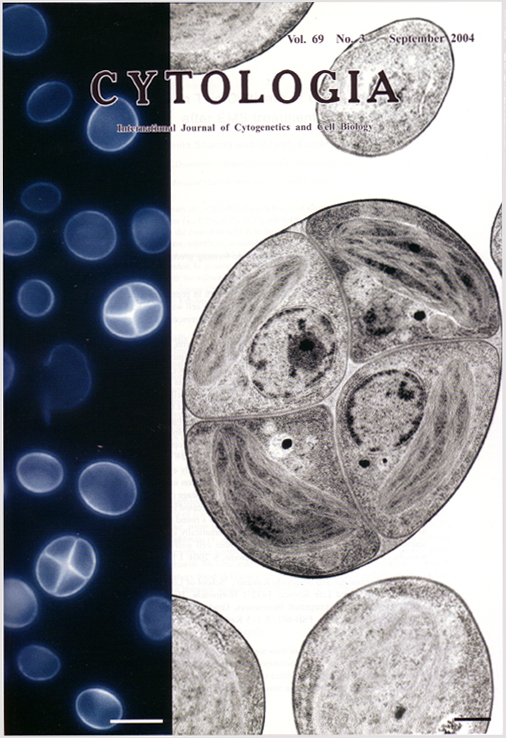| ON THE COVER |  |
|---|---|
| Vol. 69 No.3 September 2004 | |
| Technical note | |
|
|
|
| Daughter cell wall synthesis in autospore -forming green alga, Chlorella vulgaris (IAMC-536). We examined the structural changes with growth in premature daughter cell walls during the cell-division phases in C. vulgaris, using the cell wall-specific fluorescent dye Fluostain I (left panel, scale bar, 5µm and electron microscopy (right panel. scale bar,500 nm). For fluorescent microscopy of cell wall components with Fluostain I, cultured cells were stained with 0.001% Fluostain I in PBS buffer. The stained samples were examined under ultraviolet excitation for Fluostain I using a fluorescence microscope. The fluorescent image was fed into a chilled CCD camera system. This fluorescence-microscopic observation suggested two clear]y distinguishable stages in cell wall synthesis: moderate synthesis during the cell-growth process and rapid synthesis at the cell-division stage. For electron microscopy, cultured cells were fixed using the rapid-freeze-fixation method, followed by freeze substitution with 2.5% glutarldehyde in dry acetone. Subsequently, the samples were transferred to 2% OsO4 in dry acetone at 40°C for 4h. The ultra thin section was stained with 3% uranyl acetate for 2h at room temperature and with lead citrate for 10min at room temperature, and finally examined with an electron microscope at 100kV. This electron-microscopic observation indicated that daughter cell wall synthesis occurred over the cell Surface in the early stage of the cell growth process. The newly synthesized daughter cell wall gradually increased in thickness. After the second protoplast division, each daughter cell matured to a round shape. During the process of autospore maturation, the daughter cell wall dramatically increased in thickness and reached approximately the thickness of the mother cell wall before hatching (see Yamamoto, M., Fujishita, M., Hirata, A., and Kawano, S. 2004: J. Plant Res. 117: 257-264). (Maki Yamamoto1 and Shigeyuki Kawano2, 1School of Life Science, Tokyo University of Pharmacy and Life Science, 1432-1 Horinouchi, Hachioji, Tokyo, 192-0392,Japan, 2 Department of Integrated Biosciences, Graduate School of Frontier Sciences, University of Tokyo, Bldg. FSB-601, 5-1-5 Kashiwanoha, Kashiwa, Chiba, 277-8562,Japan ) |
|